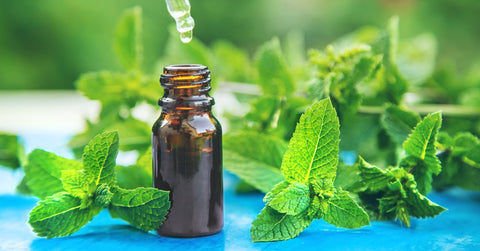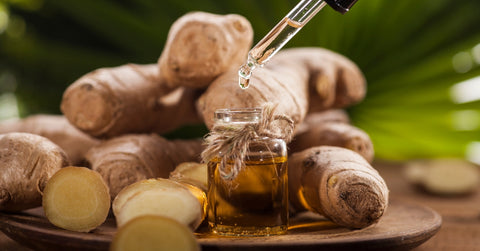The Best Essential Oils For Arthritis Pain Reduction

Arthritis is an ailment that affects millions across the globe each year. It is painful and can derail even the strongest individual for extended periods of time. And while there is not yet a cure, there are several ways to treat it. For those who are tired of relying on prescription medications or over-the-counter methods that can come with a litany of side effects, there are definitely alternatives.
One of those is the use of essential oils. Essential oils have been around for centuries to treat a wide array of symptoms and ailments, not just arthritis. Generally speaking, essential oils are used today in aromatherapy. This is the practice of using your sense of smell to promote a physiological response.
People who practice aromatherapy on a regular basis have reported feeling reduced stress levels, increased levels of comfort and relaxation, and a general improvement in their overall health. Although there is much left in the way of research to be done, there has been plenty of evidence to suggest that essential oils can have a sizable impact on the way that we treat specific illnesses and ailments.
Knowing More About Rheumatoid Arthritis
Rheumatoid Arthritis is a type of autoimmune disease. This is where the body’s immune system will begin to attack the lining of the joints causing severe joint pain as well as weakened tendons and ligaments. Even worse, rheumatoid arthritis can have an impact on several areas of your body including your eyes, skin, lungs, blood vessels, and heart. Worst of all, there’s not a single test out there for rheumatoid arthritis which means a diagnosis can take time to confirm.
Because the symptoms of rheumatoid arthritis can look very similar to the symptoms of other conditions, like connective tissue diseases, it can take time to truly understand if RA is the culprit. Talking with a physician when you begin to experience these issues is a critical step.
Physical Symptoms Of Arthritis
With arthritis, in particular, there are several physical symptoms that can permeate depending on the type as well as the severity. Things like stiffness, pain, swelling, tenderness, fatigue, and visible inflammation are just a few of these. There have also been studies conducted that show how critical the timing of treatment is for arthritis. In studies using turmeric essential oil – which has anti-inflammatory properties – it has been shown that treatment was 95-100% effective in preventing joint swelling near the time of diagnosis.
When treatment was delayed, generally until after acute inflammation began to peak, the results were less spectacular. Still, the essential oil was closer to 70% effective in relieving inflammation. It is important to keep in mind that these were all animal-based studies and that essential oils should always be heavily diluted before using them.
Basil and ginger essential oils have been found to have anti-inflammatory properties as well. With the proper dilution and then used topically, they may also be able to help treat arthritis pain. Again, more research is necessary, but the early results are promising overall.
Emotional Side Effects Of Arthritis
What does not get spoken of nearly enough is the emotional effects that battling arthritis can have. For those who have been dealing with the pain on a regular basis, there have been signs that stress and anxiety come into the equation as well. Treating those emotional distresses can be easier than treating the physical pain at times, especially with the right essential oils. Lavender essential oil is one of the most researched and popular essential oils out there and it has been considered as one of the best stress relievers among essential oils. It is also considered to have anti-inflammatory properties. There have even been clinical trials that show that lavender essential oil is effective at managing anxiety on small- to medium-sized levels.
Vanilla is another essential oil that has been proven to be beneficial in the treatment of emotional distresses caused by arthritis. In stress tests performed on arthritis patients, it was shown that vanilla oil helped to stabilize the heart rates and blood pressure of those inhaling the essential oil. Having a clearer head and being able to battle the emotional side of arthritis can help with the physical stresses. Treating both should be a priority in order to maintain both physical and mental well-being when dealing with such a painful and stressful ailment.
How To Use Essential Oils For Arthritis
As covered in the sections above, there are some studies that show that treating arthritis with essential oils has benefits when it comes to inflammation and pain relief. While there is certainly a need for further study, it is a positive sign for those afflicted with painful and frustrating ailments. There are two ways to treat arthritis through the use of essential oils: topically or through aromatherapy. If you plan on using the former method, it is essential (no pun intended) that the oil be diluted with a carrier oil first.
Essential oils, in their essence, are quite potent and should never be applied directly without being diluted first. And under no circumstances should they ever be ingested. These are important precautions to follow at any time. Carrier oils can help to dilute the essence of the essential oils which can cause severe irritation to the application site. The most common carrier oils are jojoba, olive, and coconut, though there are certainly others out there that are worth consideration.
When diluting the essential oil of choice, a good rule of thumb is to use one ounce of carrier oil for every 12 drops of essential oil. Testing the mixture is also a great idea. Apply it to a small area of skin first and then wait 24 hours to see if there are any adverse reactions. Ideally, you won’t see anything alarming which should tell you that the mixture is okay to use in larger areas. If you do see redness or a rash, you either have not diluted the essential oil enough or your skin does not respond well to that specific type of oil.
There is also the aromatherapy route; this is one of the most common methods of implementing essential oils as a treatment option. More calming essential oils, like the aforementioned lavender or vanilla, work best as they have a generally calming effect on the body and mind. You can also use aromatherapy in a number of different ways. A direct application, using something like a cotton ball, can be done with a few drops before inhaling the scent. You can also put a few drops of other absorbent materials and inhale them throughout the day.
There are also distillers. Distillers harness the essential oils and disperse them into the air in less potent quantities throughout the day. This allows the user to get the benefits of the essential oil over the course of a long period of time without having to directly inhale it from another source. It is also important to consult a physician before using essential oils. Make certain that the oils you are intending to use are the correct ones for the outcome that you’re after. The last thing you want is to get the wrong oil and wind up with a new set of issues to worry about.
Best Essential Oils For Arthritis
In addition to the few mentioned, there are other essential oils out there that can treat arthritic symptoms, particularly those of RA.
Here are the three best essential oils for arthritis:
Lavender oil is known for its calming and soothing properties. It can help reduce inflammation and relieve pain associated with arthritis. You can apply a few drops of lavender oil directly to the affected area or add it to a carrier oil for a relaxing massage.
Peppermint Oil

Peppermint oil has a cooling effect that can provide relief from arthritis pain. It contains menthol, which has analgesic properties. You can mix a few drops of peppermint oil with a carrier oil and massage it into the joints for relief.
Eucalyptus Oil

There are several compounds in the Eucalyptus essential oil that have been shown to reduce pain, swelling, and inflammation. Generally speaking, most research recommends inhaling the eucalyptus oil directly or adding a few drops to a warm bath. Because it is so easily accessible, eucalyptus essential oil is becoming one of the more common arthritis treatment methods. And, on top of the pain treatment, there have been studies that show that eucalyptus oils can even help lower blood pressure levels with continued use.
Ginger Oil

Ginger is one of those essential oils that has been long recommended for those suffering from chronic pain and inflammation. Even if you don’t use it as an essential oil, ginger can be added to meals or even taken in supplements to get the benefits. The chemicals in ginger can transform into a pretty powerful group of anti-inflammatory compounds known as gingerols once they have been digested. The essential oils can also contain other compounds, particularly ones that can ease and treat arthritis symptoms.
Frankincense Oil

This is one of those essential oils that have been getting used for thousands of years to treat a huge array of ailments, including things like inflammation and chronic pain. There are even studies that have found that the acids in frankincense have anti-inflammatory as well as analgesic properties.
One of the most beneficial acids found in Frankincense is known as Boswellic acid. These can help reduce autoimmune responses and even prevent cartilage damage. These acids also have anti-inflammatory compounds. They can also be taken in tablet form where the boswellic acid is 60% in total. And these are just a few of the essential oils that can be taken to ease the symptoms involved. Check out more to find the essential oil that will best suit your needs.
Conclusion
While essential oils can provide relief from arthritis symptoms, it's important to note that they are not a cure. It's always best to consult with a healthcare professional before using essential oils, especially if you have any underlying medical conditions or are taking medication. Essential oils can be a complementary therapy to conventional treatment and may help improve your overall well-being.


